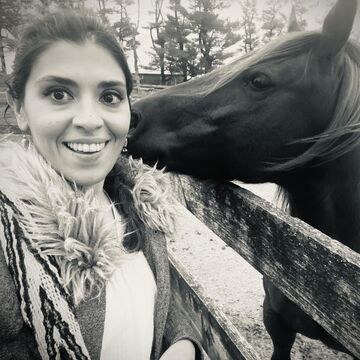| INTERIORITY ON SCREEN |
Art History, Theory, and Criticism |
2588 (001) |
Fall 2025 |
|
Description
What possibilities does filmic language offer for representing the inner lives and interior states of characters/human-subjects on screen? This course focuses on cinematic works that depict the subjectivities and mental states of their characters in unconventional, intimate, and poetic manners. Point-of-view (POV), point-of-audition (POA), close-ups, voice-over, characterization, performance style and depiction of dreams are among the cinematic elements and concepts that will be critically explored and defamiliarized throughout the course. Screenings and close study of works by filmmakers such as Lynne Ramsay, Barbara Loden, Lucrecia Martel, Todd Haynes, Apichatpong Weerasethakul, ildikó enyedi, Kathleen Collins, Márta Mészáros, Elem Klimov and Krzysztof Kie¿lowski will be accompanied by scholarly and personal essays and readings.
|
Class Number
2412
Credits
3
|
| Directing Actors for Film and Video |
Film, Video, New Media, and Animation |
3020 (001) |
Fall 2025 |
|
Description
This is a Production Laboratory class for students interested in working with the ideas and techniques of directing performers for the camera. We will consider issues of scripting, pre-production, rehearsing, shooting, and editing performances. The course requires active participation in 3 roles -- as a director, performer, and camera operator -- as these constitute the primary collaborative relationships of a director. The main objective of this class is to get students to consider various methods of directing performers that both explore and elaborate on traditional theatrical schools of directing. Through hands-on experience, readings, critique and screenings, students will begin to carve out their own style of working.
|
Class Number
1477
Credits
3
|
| Experimental Film and Video Narrative |
Film, Video, New Media, and Animation |
3026 (001) |
Spring 2026 |
|
Description
This course is a production class designed for students interested in alternative modes of narrative production in film and Video. Through workshops on writing, acting, and directing, students learn to work with actors, dialogue, and alternative narrative structures. Students apply the concepts covered in class to their selected projects, from production through editing. Throughout the course, a wide range of narrative films utilizing experimental modes of production are screened. Technical issues are covered in cinematography workshops, but it is assumed that students have a solid technical grounding in their medium of choice. Though the body of this class focuses on film and video production, the class is also appropriate for students working in performance and sound.
|
Class Number
1461
Credits
3
|
| FVNM: Professional Development Strategies for Emerging Filmmakers |
Film, Video, New Media, and Animation |
3919 (001) |
Spring 2026 |
|
Description
This Professional Practice course is designed for students with practical experience and understanding of the language and process of fiction, non-fiction, hybrid or experimental film production, and who would like to prepare themselves for professional survival and growth as emerging filmmakers outside of school. The topics covered at the class will include: producing project proposals for grants, fellowships and labs; learning about local, national and international film communities, networks and institutions; discussing festivals and other conventional or DIY distribution models; learning about programming and writing about film as career paths; and strategies for building film communities and production teams such as companies and collectives.
We will watch and discuss works by notable SAIC alumni such as Apichatpong Weerasethakul, and will have in-person and virtual visits and discussions with local and global filmmakers, programmers, distributors, centers and platforms. Selected successful recent film projects will be discussed as case studies; we will research the life of each project from ideation to fund-raising, production and distribution.
Students will practice professional development by working around one of their own past or in-progress film projects and producing a body of documents around it, including a proposal for a grant or a lab, an artist/director statement, visual treatment and mood-board, and a written festival and distribution plan.
|
Class Number
2194
Credits
3
|
| Grad Projects:Film/Video/New Media |
Film, Video, New Media, and Animation |
6009 (002) |
Spring 2026 |
|
Description
Taken every semester, the Graduate Projects courses allow students to focus in private sessions on the development of their work. Students register for 6 hours of Graduate Project credit in each semester of study.
|
Class Number
2286
Credits
3 - 6
|
| Grad Projects:Film/Video/New Media |
Film, Video, New Media, and Animation |
6009 (007) |
Fall 2025 |
|
Description
Taken every semester, the Graduate Projects courses allow students to focus in private sessions on the development of their work. Students register for 6 hours of Graduate Project credit in each semester of study.
|
Class Number
2472
Credits
3 - 6
|

